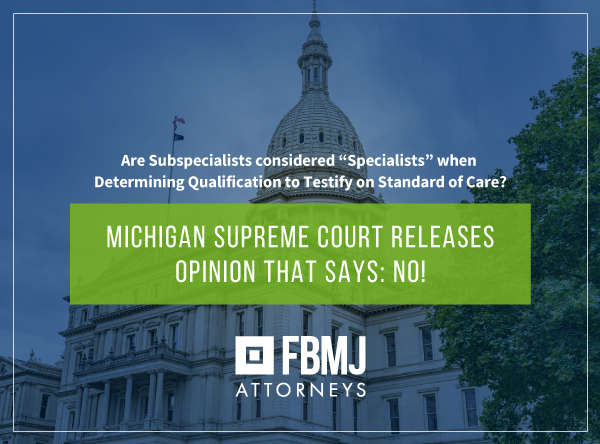Are Subspecialists considered “Specialists” when Determining Qualification to Testify on Standard of Care? Michigan Supreme Court Releases Opinion that says: NO!

The long-awaited opinion of Horn v. Swofford was just issued by the Michigan Supreme Court on July 25th. The crux of the case was whether a neuroradiologist was qualified to testify against Dr. Swofford who was a diagnostic radiologist reading a brain CT scan. In partially overturning its seminal 2006 case of Woodard v. Custer, the Michigan Supreme Court held that a subspecialty is not considered a specialty for purposes of MCL 600.2169. In other words, with respect to Dr. Swofford, unless an argument could be made under the weaker standards of MCL 600.2169(2)-(3) or MRE 702, a neuroradiology expert could offer standard of care testimony against a diagnostic radiologist, such as Dr. Swofford.
WHY IS THIS IMPORTANT?
- More Malpractice Suits: The American Board of Medical Specialties recognizes 40 medical specialties and lists 134 subspecialties. Internal Medicine and Pediatrics eachhave 20 recognized subspecialties! Per Horn v Swofford, it is only the primary specialty that must match. The number of potential experts that plaintiffs can rely on to offer expert testimony has greatly expanded. With more experts who now qualify under our statute, more malpractice cases may be filed with support from experts who do not match a subspecialty defendant. Further, depending on the facts, subspecialists may now be called to support a case against doctors not trained in the subspecialty.
- Less Certainty in Predicting Who is Qualified: Expect different judges to rule differently on who is and is not qualified.
- More Costly Defense: The ruling may result in more discovery and motion-filing, and in turn, may even ultimately affect premiums and coverage.
When the issue of expert qualifications under the statute is now brought up in front of the trial courts, given the weaker standards of MCL 600.2169(2)-(3) and MRE 702, we will likely see inconsistent rulings between jurisdictions and judges necessarily leading to more appeals in the area.
For a more detailed discussion of this case, please click here, or contact FBMJ attorneys Brian Whitelaw or Silvia Alexandria Mansoor from our Medical Malpractice Practice Group.

